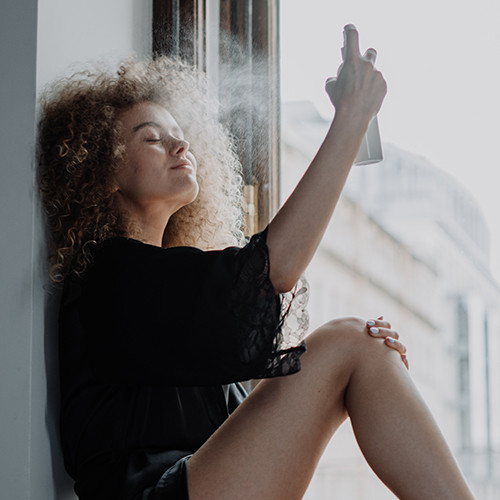Lies, All Lies! Common Myths About Skin Hydration
Posted by Nikki Wisher on Oct 30th 2020
There are certain pieces of advice that you hear left and right, and everyone seems to think they’re the first one to think up these genius ideas. “You know, you should really be drinking more water.” Really, Janet, should I? I’ve never heard before that water is important for health.
As irritating as all those Janets may be, they’re also correct in more ways than they realize. Hydration is critical for your body, but it’s also essential for your skin. The problem is that there are far too many myths floating around about skin moisturizers and how to put them to good use for your glow.
Those myths end today, folks, because I’m here to give it to you straight.
1. Only Dry Skin Needs Moisturizer
Most people know about the essential skin types: oily, dry, normal, and combination. For clarity, combination skin is skin that is oily in some places and dry in others.
People often hear this and they think, “Since moisturizer is meant to keep skin from getting dry, and I’m on the opposite side of the spectrum with oily skin, moisturizer is the last thing I need.” In reality, the opposite is true.
Moisturizer’s real purpose is to stabilize the hydration in your skin at a healthy level. If you try to deal with your oily skin by drying out the skin too much, your body will actually try to compensate for the drying by producing even more oil than before. This is why it’s so important to normalize your hydration with moisturizer, no matter what skin type you may have.
You can still use your skin type to choose your moisturizer, though. For example, if you have oily skin, opt for an oil-free moisturizer.
2. Showers Hydrate Your Skin
I understand the logic behind this myth. Water is hydrating, so when you take a shower and cover your body in water, it’ll hydrate your skin, right?
Not exactly. When it comes to hydration, the problem isn’t that you don’t have enough water seeping into your skin. The problem is that you don’t have enough of a protective barrier to keep the water in.
When you shower, the water stays in your skin for a short time but in the process, it strips away your natural oils that maintain your moisture barrier. This means that when you shower, especially when you use hot water, it dries out your skin instead of hydrating it.
The solution is simple: always use a moisturizer after you shower. The moisturizer will lock in that temporary hydration from the shower while restoring your skin’s protective barrier so it doesn’t dry out.
3. Acne-Prone People Shouldn’t Use Moisturizer
Acne is a frustrating condition for anyone who suffers from it because there aren’t any default treatments that work for everyone. It’s even more frustrating if you’re misled by myths that are doing more harm than good.
The myth is that moisturizer makes oily skin even oilier, which causes breakouts. As I explained above, moisturizer doesn’t actually make skin oilier, especially if it’s oil-free moisturizer. There’s a second problem with this myth, though: acne isn’t always caused by oily skin.
In some cases, especially with adult acne, dryness makes your skin flaky. The flaking skin cells get into your pores and block the oil that’s trying to come out, which causes breakouts.
If you struggle with acne, a moisturizer is more likely to help you than to hurt you. The key is to choose a lightweight moisturizer that is designed with acne-prone skin in mind, like the Bioelements Remineralist Daily Moisturizer.
4. Moisturizer Is the Only Way to Hydrate Your Skin
I’ve spent most of this blog singing the praises of moisturizers, and it’s true, they do a heck of a job. Your skin has two sides, though: inside and outside. To maintain a steady balance of skin hydration, you need to be firing from both angles.
In addition to locking in hydration with moisturizer on your skin’s surface, you need to refresh it from within by drinking plenty of water. There’s still debate about how much water you actually need, but most medical experts recommend that you use your body weight as a guide.
Take your weight and divide it in half. That is the number of ounces of water you should drink each day. For example, someone who weighs 150 pounds should drink 75 ounces of water per day.
5. Moisturizer Alone Will Prevent Aging
It’s true that using daily moisturizer in the morning and at night will help your skin look younger, but it doesn’t happen the way many people think. For one, the moisturizer keeps your skin hydrated which makes it healthier, and this can slow down aging to a degree. Moisturizer also helps you look more youthful on a daily basis because it plumps your skin for a matter of hours, minimizing your wrinkles that day.
To be honest, though, moisturizer only slows the aging process to a subtle degree. If you truly want to reduce signs of aging you already have and slow the aging process for the future, you need a product that specifically has age-defying ingredients.
One way to do this is by adding an anti-aging serum like a retinol serum to your routine to stimulate skin-firming collagen. If you’re more of a minimalist, though, try a moisturizer with anti-aging ingredients built in, like the BABOR Lifting Rx Collagen Cream Rich.
Drink Up, Beautiful Skin!
Your skin is an active part of your body, and it needs serious maintenance to stay in tip-top shape. One of the key ways to do that is by giving it the hydration it needs, and now that you’ve shed these common moisturizing myths, you’re well-equipped to get the job done. Happy hydrating, everyone!

